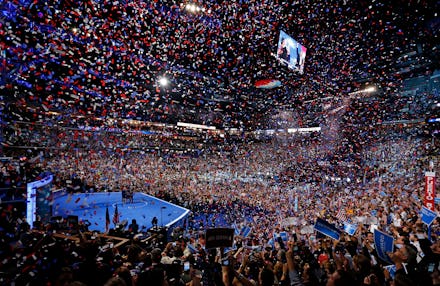The Strange History of Superdelegates: What They Mean for Super Tuesday and Beyond

Superdelegates. You've probably heard something about them, but might not know what they are, how they work or why they matter.
Ask Bernie Sanders supporters, and they say superdelegates are a major roadblock to American democracy. "They seem like they're just there for the DNC to manipulate the process," said Rob Akleh, who launched a petition with the organization Ready to Fight that has received 200,000 signatures to stop using superdelegates.
Ask Democratic Party leadership, and they'll tell you the opposite, that superdelegates exist to protect our democracy. Speaking to CNN's Jake Tapper, Democratic National Committee chair Debbie Wasserman Schultz claimed, "Unpledged delegates exist really to make sure that party leaders and elected officials don't have to be in a position where they are running against grassroots activists."
So which is it? Are superdelegates anti-democratic? Do they skew election results in favor of establishment candidates? How will they sway the race one way or the other following the outcome of Super Tuesday?
Read more:
Contrary to what most grassroots activists might say, evidence shows superdelegates have actually not significantly changed the outcome of presidential elections since they were introduced in 1982. However, given the particularly populist nature of Sanders' campaign and the potential outcome of primaries and caucuses on Super Tuesday, this year may prove to be an exception.
How we got here: In 1982, the Democratic Party had endured massive losses in two of three most recent general elections. Jimmy Carter was crushed by Ronald Reagan in 1980, winning only six states and the District of Columbia. Sen. George McGovern lost by an even larger margin in 1972, carrying only one state and D.C. The party believed it had electability issues, and in 1980 convened the Commission on Presidential Nominations to come up with new ideas about the primary process in order to have more electable candidates. The commission came up with a number of reforms that were adopted in 1982, including the superdelegate system.
Initially, about 14% of the approximately 3,000 total delegates to the national convention were superdelegates. The vast majority of delegates were bound to vote at the convention based on the results of state primaries, but superdelegates were free to vote for any candidate. The early superdelegates were party leaders who were considered more moderate than the party's liberal base. "The new rules produced a group of 'superdelegates' who were older, more experienced, more moderate and more loyal to the party than the delegates chosen by primaries and caucuses," the New York Times reported in 1984.
In 1988, the DNC expanded the definition of a superdelegate to include all Democratic members of Congress, Democratic governors, as well as other party leaders. Today, there are over 700 superdelegates who vote at the Democratic convention, or about 15% of total delegates.
The fear of superdelegates: Since their inception, many candidates have feared superdelegates would overturn the will of the people by throwing their weight behind candidates who had not won the majority of delegates in primaries and caucuses. However, superdelegates have historically always followed the popular vote.
In 1992, there were concerns Bill Clinton's campaign would falter because he would be unable to sway superdelegates. Eventually, superdelegates supported Clinton by a large margin. Similarly in 2008, organizations supporting then-Sen. Barack Obama voiced concerns about superdelegates delivering a victory to Hillary Clinton, even if Obama won the popular vote. Slowly, this fear was shown to be unsubstantiated. Obama eventually won a large majority of superdelegates, in addition to pledged delegates.
In fact, the only time superdelegates have had a direct influence is in 1984, when they put Walter Mondale over the threshold needed to secure the nomination. Mondale had narrowly won the pledged delegate count, but not by enough to ensure victory. Superdelegates kept the convention from being brokered. In this case, the idea of superdelegates choosing an eminently electable nominee backfired, as Mondale went on to win only one state and D.C. against Reagan in the general election.
Why Sanders' situation is unique: 2016 may be the year superdelegates break from the popular vote by a wide margin. As the race currently stands, Democrats are still closely divided between Clinton and Sanders. However, superdelegates have pledged their support almost entirely for Clinton.
Although superdelegates can change their vote even after they pledge, Sanders supporters may have legitimate cause to be concerned. For one, Sanders is running specifically as an anti-establishment candidate, which has drawn him many comparisons to McGovern, the candidate for whom superdelegates were created to prevent becoming the nominee in the first place.
A 2008 investigation showed both Clinton and Obama gave substantial amounts of money to superdelegates, and that 82% of superdelegates who had endorsed by February 25 of that year voted for the candidate who had given the most money toward their campaign. This year, there will be more money given to superdelegates than ever before. The DNC recently removed the ban on lobbyists and PACs donating to campaigns. This opens the floodgates for organizations in support of candidates to donate to superdelegates.
"At its (the superdelegate system's) root, it's heavily influenced by money in politics," Josh Silver, founder of Represent.Us, told Mic. "Superdelegates skew heavily towards party apparatus players and lobbyists."
With the ban lifted, a pro-Clinton super PAC has begun donating large amounts of money to state leaders. The Hillary Victory Fund has given $2.9 million to state committees, Bloomberg reported, including $124,000 to New Hampshire, where all of the superdelegates pledged support to her, despite Sanders winning the state by a substantial margin.
The takeaway: So while historically superdelegates haven't gone against the popular vote, there is a real possibility that 2016 may be the year superdelegates do not line up with the will of the people. Even if Clinton ends up winning the popular vote and the nomination, this election has exposed the weakness of the current system.